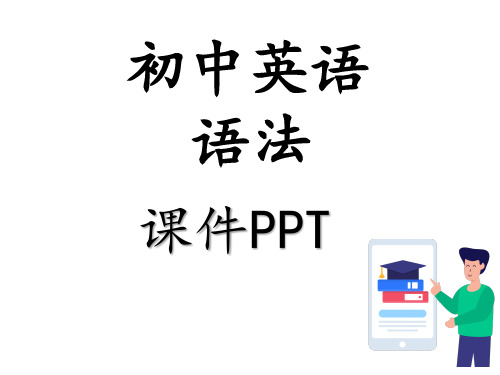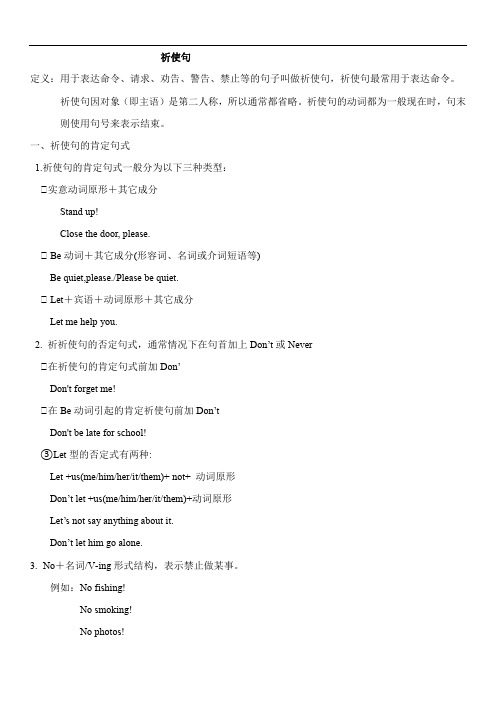课件专题十三反意疑问句祈使句感叹句以及其它特殊句式
专题十三 反意疑问句

(3)以Let me开头的祈使句,当表示允许、请求和建议时,其附加 句用may I; 当表示征求建议时,用will you; Let me give you a hand, may I? Let me go out at once, will you? 2、感叹句: 当陈述部分是感叹句时,附加问句中的主语和谓语要根据感叹句 中的主语和谓语来确定。当主语是人时,疑问部分用he或you等 人称代词代替;当主语是物时,疑问部分用it代替; What a beautiful seaside city Qingdao is, isn't it? How hard Tom works, doesn't he? 3、含宾语从句的复合句: (1)附加句应与主句的主语、谓语保持一致; He said he was sorry, didn't he? (2)当陈述部分是“I/we think/believe/guess/suppose+宾语从 句”, 附加句的动词和主语应和宾语从句的动词和主语保持一致; I think he can finish the work by himself, can't he?
B.must表示“必须”时,附加句的谓语动词用needn't; You must go back right now, needn't you? C.mustn't表示“禁止”时,附加句的谓语动词用must; You mustn't play football in the fields, must you?
10、动词不定式、动名词等作主语时的反意疑问句:疑问部分的 主语通常用“it”; Learning English well takes a long time, doesn't it? 二、反意疑问句的答语:Yes+肯定结构;No+否定结构 ---He didn't come to school yesterday, did he? ---Yes, he did. ---No, he didn't. 三、一些特殊的反意疑问句: 1、祈使句: (1)肯定的祈使句的附加句可用will you或won't you;否定的祈使 句 的附加句用will you; Come to school early next, will you? Don't shout at your brother, will you? (2)以Let's开头的祈使句,附加句应用shall we;而以Let us开头的 祈使句,附加句应为will you; Let's go, shall we? (包括听话人在内) Let us go now, will you?(不包括听话人在内)
祈使句、感叹句、反义疑问句

5, 陈述部分是I am..,疑问部分要用 aren‘t I.
I am officially a college student. Aren’t I?
6,陈述部分有have to +v.原 (had to + v.原),疑问部分
常用don‘t +主语(didn’t +主语)。
You have to become the chair. Don’t you?
No photos at the Monsters Inc.
祈使句的回答
一般用will或won’t回答 注意:回答否定意义的祈使句时 1. 形式一致,即Yes与will保持一致;No与 won’t保持一致。 2. 意思相反,即Yes是不的意思;No是“是” 的意思。在回答时,要注意分析上下文语 境中所提供的条件。
Be careful! There is a huge Frisbee(飞盘) coming through the campus!
3. Let+宾语(人/物)+do…
Let it not be just the beginning of my dream, but the beginning of all of our dreams.
what与how引导的感叹句,可以相互转换。
What an interesting story it is!=How interesting the story is!
What a beautiful building it is!=How beautiful the building is! 在口语中,感叹句的主语和谓语常常省略。 What a nice present (it is)! How disappointed (she/he/… is)!
英语反意疑问句、祈使句、感叹句以及特殊句式

专题十三反意疑问句、祈使句、感叹句以及其它特殊句式【考纲解读】高考英语在重视对语义和功能考查的同时,并未完全放弃对语言形式和语言知识类题目的考查,主要涉及强调句、倒装句、省略句、反意疑问句、祈使句、感叹句以及其它特殊句式如there be 句型等。
反意疑问句是高考经常考查的语法项目之一,考查的重点是:祈使句和含有宾语从句的主从复合句的反意疑问句及句尾的附加成分等。
主要考点有:1. 祈使句的判断2. 祈使句固定结构3. 反意疑问句一般用法及特殊用法【知识要点】反意疑问句由“陈述句+附加疑问句”构成,附加疑问句常常表示反意,因此附加疑问句通常被称为反意疑问句。
附加疑问句由“助动词/情态动词/系动词+主语”构成,它们需要与陈述句的动词和主语对应。
如果陈述句的主语是名词,附加疑问句的主语要用相应的代词替换。
一、反意疑问句重点知识梳理例7 That’s unfair, isn’t it? 这是不公平的,是吗?例8 The meeting is unimportant, isn’t it? 这个会议不重要,对吗?4.如果陈述句是“I’m…”结构时,反意疑问句用aren’t I。
例9 I’m a good student, aren’t I? 我是一个好学生,对吗?例10 I’m going to attend your lecture, aren’t I? 我打算听你的讲座,好吗?5.如果陈述句是“There be”句型,反意疑问句也借助there。
例11 There is a tall tree in front of your house, isn’t there? 你家房前有一棵大树,是吗?例12 There used to be a bus stop near our school, usedn’t there/didn’t there? 我们学校附近曾经有一个汽车站,对吗?例13 There stands an old temple on the top of the mountain, doesn’t there? 山顶矗立着一座古庙,是吗?6.如果陈述句的主语是one,反意疑问句的主语在正式场合用one, 在非正式场合用you。
【高考】英语语法复习特殊句式倒装句,强调句,反义疑问句,感叹句,祈使句,省略和主谓一致 教学课件

1st week
2nd week
3rd week
句子成分 冠词 代词
形容词和副词 语义辨析
动词和动词词组 动词的时态和语态
并列句和状语从句 特殊句式
非谓语动词
情态动词和虚拟语气
定语从句和名词性从句
感叹句、祈使句
反义疑问句 倒装句、强调句
表示说话时强烈感情
What a cute cat!
强调句
结构: It is/was +被强调部分+that/who+其他成分
强调结构
单词 短语 从句
强调成分
主语 宾语 状语
强调句
结构: It is/was +被强调部分+that/who+其他成分
It is I who/that am right.
主语
It was him that/who we met at the school gate.
Someone likes my voice, ________?
4.如果陈述句的主语是something, nothing, anything, everything 等不定代词时,反意疑问部分的主语多用it。 陈述部分主语是everyone, everybody, someone, somebody, anybody, no one, nobody等时,疑问部分用they, he;
Let’s go to the park, shall we?
Let us help you, will you?
主句主语为I/we,谓语动词是 think, suppose, expect, believe, imagine等
I think he is a good student, isn’t he? We don’t think you are right, are you?
中考英语语法第20讲课件--祈使句、感叹句、反义疑问句、it、倒装句

• 这一句式中的形容词位置也可换用名词;连系动 词be也可换用其它连系动词,如feel等。 • It‟s a good habit to get up early and go to bed early. • 早睡早起是好习惯。 It must be great fun to fly to the moon in a spaceship. • 乘宇宙飞船飞往月球一定很有趣。 It feels strange to have a twin sister. • 有个孪生姐妹感觉很奇怪。
反意疑问句特殊情况 1,当陈述部分含有 little/few/never/hardly/seldom/no/neith er/nobody/nothing,none等表示否定意义的 词时,疑问部分要用肯定形式。 She has few friends, does she? She has never been there,has she? There was nothing in the box, was there? None of us knows it, do we?
祈使句的否定句式
祈使句的回答
• 祈使句的动作通常是表示将来发生的动作, 所以回答祈使句时,一般用will或won‟t。 在回答具有否定意义的祈使句时,要注意 两点:一是形式一致,即Yes与will保持一 致;No与won‟t保持一致。二是意思相反, 即Yes是不的意思;No是“是”的意思。 在回答时,要注意分析上下文语境中所提 供的条件。
• • • • • • • • •
•
1.It +is /was +one‟s turn(duty,pleasure) +to do sth. 意为“该轮到某人做某事(做某事是某人的责任、愉悦的事)”。 如: It‟s your turn to be on duty tomorrow. 明天轮到你值日了。 2.It takes(sb.)some time to do sth. 意为“(某人)花……时间做某事”。如: It took me a week to finish reading the book. 我花了一周时间看完这本书。 3.It +cost/costs +sb.+some money +to do sth. 译为“某人花多少钱做某事”。 如: It cost me 260 yuan to buy the new watch. 我买这块新手表花了260元。 4.It seems /seemed +从句。 译为“看起来好像……”,此结构可以转换成“seem +动词不定式” 形式。如: It seems that he is ill.=He seems to be ill.看起 来他好像病了。
反义疑问句(共14张PPT)全

二、前否+后肯
1.She wasn’t ill last week, was she ? 2.It doesn’t often rain here, does it? 3.Tom won’t go to Shanghai next year,
will he ?
特殊用法1—祈使句的反义疑问句
1、肯定祈使句的反意疑问句,疑问部分用will you或won’t you,否定祈使句则用will you ? 如: Don't do that again, will you? Go with me, will you / won't you?
13、He who seize the right moment, is the right man.谁把握机遇,谁就心想事成。2024/10/172024/10/172024/10/172024/10/1710/17/2024 +14、谁要是自己还没有发展培养和教育好,他就不能发展培养和教育别人。2024年10月17日星期四2024/10/172024/10/172024/10/17 +15、一年之计,莫如树谷;十年之计,莫如树木;终身之计,莫如树人。2024年10月2024/10/172024/10/172024/10/1710/17/2024 +16、教学的目的是培养学生自己学习,自己研究,用自己的头脑来想,用自己的眼睛看,用自己的手来做这种精神。2024/10/172024/10/17October 17, 2024 +17、儿童是中心,教育的措施便围绕他们而组织起来。2024/10/172024/10/172024/10/172024/10/17
一 、前肯+后否 含be动词
1.He is a doctor, isn’t he? 2.I am Chinese, aren’t I?
小升初英语主谓一致反意疑问句祈使句感叹句一般疑问特殊疑问句等句型总复习ppt课件

为深入学习习近平新时代中国特色社 会主义 思想和 党的十 九大精 神,贯彻 全国教 育大会 精神,充 分发挥 中小学 图书室 育人功 能
反意疑问句
反意疑问句:附在陈述句之后,对陈述句所说的事实或观点提出疑问。 结构:助动词/情态动词+主语, 前肯后否,前否后肯。 eg: He likes playing football, doesn’t he?
Birds rarely build nests in our garden, do they? He hardly says such words, does he?
(4)陈述句的主语是不定代词everything, something, anything, nothing时,其后的反 意疑问句主语用it。
句型连接两个名词或代词作主语时,根据就近原则决定谓语动词形式。但是如果
either, each, neither作主语,则动词为单数形式。
Either my wife or I ________(am / is / are)going.
Neither you, nor I, nor anyone else ________(know / knows)the answer.
☆6. 动词不定式,动名词作主语时,谓语动词用单数形式。 To see ________(is / are)to believe. 眼见为实。 Doing eye exercises ________(is / are)good for your eyes. 做眼睛保健操对你的眼睛十分有益。
☆7. a/an+单数名词+or two 作主语,谓语动词用单数。 A student or two ________(like / likes)to listen to this new teacher’s class. 一两个学生喜欢听这位新习近平新时代中国特色社 会主义 思想和 党的十 九大精 神,贯彻 全国教 育大会 精神,充 分发挥 中小学 图书室 育人功 能
英语复习课件(人教):简单句陈述句、疑问句、反意疑问句、感叹句、祈使句、倒装句(共20张PPT)

反意疑问句的构成: 陈述句+附加疑问句?附加疑问句的 否定式必须缩写。
1.陈述句部分与附加疑问句部分意思相反: 前肯后否、 前否后肯。
Mary is a teacher, ___is_n_'_t_s_h_e_? He didn't tell you the story, ___d_id__h_e___? 2.反意疑问句的基本对应形式如下: (1)be动词对应be动词。如: She is a policewoman, __i_sn__'t_s_h_e__? (2)情态动词对应情态动词。如: He can drive the car, __c_a_n_'_t _h_e__?
语法互动(十二)┃简单句(陈述句、疑问句、 反意疑问句、感叹句、祈使句、倒装句)
考点、疑问句、 反意疑问句、感叹句、祈使句、倒装句)
W__h__a_t ___ a beautiful flower it is! 这是一朵多么漂亮的花啊! _W__h__at___ good news it is! 多好的消息啊! _H__o_w____ fast Jim runs! 吉姆跑得多么快啊!
语法互动(十二)┃简单句(陈述句、疑问句、 反意疑问句、感叹句、祈使句、倒装句)
考点一 陈述句 陈述句是用于陈述一个事实或表达说话人的看法的句子。
陈述句主要分为肯定句和否定句。 1.陈述句的肯定句式主要有五种基本句型 (1)“主语+系动词+表语” I am honored. 我很荣幸。 (2)“主语+不及物动词” The students work very hard. 学生们学习很努力。 (3)“主语+及物动词+宾语” I teach English. 我教英语。
语法互动(十二) 简单句(陈述句、 疑问句、反意疑问句、感叹句、
英语语法反义疑问句ppt

祈使句的反意疑问句
肯定的祈使句:won’t you ? / will you ? 祈使句的反意疑问句
否定的祈使句:will you ? 注:Let’s … , shall we?
Let us…, will you? e.g. Let us go to watch the movie, will you ? Let’s walk to the shops instead of taking the car, shall we ? Don't play computer games, will you?
B. is she
C. did she C. hasn’t he C. did she C. don’t they C. hasn’t she
D. wasn’t she D. doesn’t he D. didn’t she D. will they D. has she
6. There won’t be any concert this Saturday evening, C ?
A. will there not
B. will there C. is there
D. won’t there
7. He dislikes the two subjects, B he?
A. does
B. doesn’t
C. is
8. Let’s go there by bus, B ?
D. isn’t
特殊的反意疑问句
特殊的反意疑问句: (1) 主+ used to do sth, didn't/usedn't+主?
She used to get up at 7 o'clock, didn't/usedn't she ?
英语语法简单句陈述句、疑问句、反意疑问句、感叹句、祈使句、倒装句课件PPT

语法互动(十二)┃简单句
2.反意疑问句的基本对应形式如下: (1)be动词对应be动词。 She is a policewoman, __is_n_'_t_s_h_e__? (2)情态动词对应情态动词。 He can drive the car, __c_a_n_'t_h__e__? (3)行为动词对应助动词的相应形式。这种助动词主要指帮助 构成疑问句或否定句的do, does, did以及它们的否定形式。 He slept for 9 hours yesterday, _d__id_n_'_t_h_e__? He didn't go to the park, __d_i_d_h__e___?
I don't think the answer is right, ____is____ ____it____? 3. 让我们去购物,好吗?
Let's go shopping, ___sh_a_l_l__ ____w_e___? 4.这是多么令人兴奋的消息啊!
__H__o_w___ _e_x_c_i_ti_n_g_ the news is!
On the right of my school is my house. 学校的右面是我的家。
语法互动(十二)┃简单句
考点过关
根据汉语意思完成句子 1.你在这里工作多长时间了?
__H__o_w___ ___l_o_n_g__ have you worked here? 2.我认为这个答案不正确,是吗?
初中英语 语法
课件PPT
语法互动(十二) 简单句 (陈述句、疑问句、反意疑问句、
感叹句、祈使句、倒装句)
语法互动(十二)┃简单句
中考要求
祈使句,感叹句,反义疑问句,倒装句

祈使句定义:用于表达命令、请求、劝告、警告、禁止等的句子叫做祈使句,祈使句最常用于表达命令。
祈使句因对象(即主语)是第二人称,所以通常都省略。
祈使句的动词都为一般现在时,句末则使用句号来表示结束。
一、祈使句的肯定句式1.祈使句的肯定句式一般分为以下三种类型:①实意动词原形+其它成分Stand up!Close the door, please.① Be动词+其它成分(形容词、名词或介词短语等)Be quiet,please./Please be quiet.① Let+宾语+动词原形+其它成分Let me help you.2. 祈祈使句的否定句式,通常情况下在句首加上Don’t或Never①在祈使句的肯定句式前加Don’Don't forget me!①在Be动词引起的肯定祈使句前加Don’tDon't be late for school!③Let型的否定式有两种:Let +us(me/him/her/it/them)+ not+ 动词原形Don’t let +us(me/him/her/it/them)+动词原形Let’s not say anything about it.Don’t let him go alone.3.No+名词/V-ing形式结构,表示禁止做某事。
例如:No fishing!No smoking!No photos!4.以may为句首的表示祝愿的祈使句.May you + 动词原形1) 祝你成功!May you succeed!2) 祝你一路平安!May you have a safe journey!5.don’t/doesn’t/didn’t后跟动词原形Please后跟动词原形练习:单项选择1. ________ stand too close to North Americans. Give them more personal space.A. Aren'tB. Didn'tC. Won'tD. Don't2. ---Is there a No. 2 bus stop near here?---Yes, there is. __________ at the second crossing, and you will find it.A. Turning leftB. Turn leftC. To turn leftD. Turns left3. —________. The baby is sleeping. I'm sorry.A. Not talkB. Not talkingC. Don't talkD. Can't talk4. — _______ late for school again, Tim! — Sorry, I promise that I _______.A. Don’t; won’tB. Don’t be; won’tC. Don’t be; don’tD. Don’t; will5. Don’t ___ shy. Everyone may make mistakes at the beginning.A. amB. isC. beD. are6. Please . The boy is studying.A. not noisyB. don’t noisyC. not to be noisyD. don’t be noisy7. —I’m leaving now. —________ you turn off the lights and the computer.A. To make sureB. Make sureC. Made sureD. Making sure8. Tony, ________, or you will get heavier.A. doesn't play sports any moreB. doesn't eat so much meatC. don't play sports any moreD. don't eat so much meat9. Don’t _______ too much TV. It’s bad for your eyes.A. watchingB. to watchC. watchD. watches10. —Would you please _______ near the river? Oh, sorry, I won’t.A. not playB.don’t playC. not to play11. — Please don’t make a noise. — ________ . I’ll be as quiet as a mouse.A. Yes, I doB. No, I don’tC. Yes, I willD. No, I won’t12. — ______, please.K-E-Y.A. What’s thisB. Spell itC. Can you spell itD. What is it13. _________ play in the street. It’s very dangerous.A. DoB. NotC. Don’tD. Doesn’t14. climb the tree! It’s too small. Come down quickly!A. Don’tB. Isn’tC. Aren’tD. Do15. —Don’t forget to close the door after school. — ________.A.OK, I won’tB.OK, I will.C.Yes, I do.D.No, I don’t.16. ---Sorry for being late again. ---__________here on time next time, or you’ll be punished.A. BeB. BeingC. To beD. Been17. _____ drive too fast .We have enough(足够的)time to get there.A. NotB. Don’tC. doesn’t18. Boys and girls, _____in bed. It’s bad for your eyesA. not readB. doesn’t readC. no readD. don’t read感叹句感叹句:表示赞美、惊叹、喜悦等感情;表达喜、怒、哀、乐、惊、恐等强烈情绪;感叹句分为两种:一种以what引导,一种以how引导。
中考复习 反义疑问句 祈使句 感叹句 (共17张PPT)

一. 感叹句 4. ___H_o_w____ interesting the dog is!
How + 形容词/副词 + 主 +谓
5. ___H_o_w____ useful a subject it is! How + 形容词 + a/an + 可数名词单数+主+谓
6. ___H_o_w_____ time flies! How + 主+ 谓
否定的祈使句句型 Don`t be late. Let`s not speak loudly.
Don`t + v Let`s + not + v
3. --- _W__h__a_t_a_ pleasant journey it is!
What a/an adj.+ n! Journey 可数名词
二. 祈使句
以动词原形开头,主语省略
Come in!
Be quiet!
有时为了加强语气,在动词前加do, 表“务必”
Do come on time!
有否定词的反义疑问句
判定找动换代
1. Bob rarely got drunk, _d__id___he?
2. She seldom goes to the cinema, __d_o_e_s_she?
陈述部分有seldom, hardly, never, rarely, few, little, nowhere, nothing, nobody, scarcely等(半)否定词时,附加疑问词用肯定形式。
Tom has a new watch, _d_o__e_s_n_`_t_/_h_a__s_n_`_t_ he ?
高考英语二轮复习课件:专题十三反意疑问句-祈使句与感叹句(共55张PPT)

5. 陈述部分含有must表推测的反意疑问句 (1)对现在的推测 You must be hungry now,aren't you? 你此刻一定很饿,对吧? =I'm sure you're hungry now,aren't you? (2)对现在进行时的推测 He must be watching TV now,isn't he? 他现在一定在看电视,对吗? I'm sure he is watching TV now,isn't he?
A.isn't she B.hasn't she C.isn't it D.hasn't it 2.The ground is wet all over, so I'm sure it must have rained
否定、肯定形式
1. 一般说来,前后两部分的否定、肯定形式相反;但当句子前有Oh,Ah, So等语气词时,前面两部分的否定、肯定形式相同。 2. 前面部分有否定词或半否定词时,后面部分用肯定形式;但若前面部分 含有由否定词缀构成的否定词时,后面部分还是用否定形式。
There used to be a cinema here before the war,use(d) n't there/didn't there? Such things ought not to be allowed,ought they? He seldom comes late,does he? You don't think he can finish the work by himself,do you? Have a cup of tea,will you?
- 1、下载文档前请自行甄别文档内容的完整性,平台不提供额外的编辑、内容补充、找答案等附加服务。
- 2、"仅部分预览"的文档,不可在线预览部分如存在完整性等问题,可反馈申请退款(可完整预览的文档不适用该条件!)。
- 3、如文档侵犯您的权益,请联系客服反馈,我们会尽快为您处理(人工客服工作时间:9:00-18:30)。
反意疑问句、祈使句、感叹句以及其它特殊句式知识要点反意疑问句的主要考点一、陈述句如果是 there be 句型,则附加疑问句要用 there 充当主语,而不用 it 或者 they 来与存在句中的主语保持一致: 1. There is a cup on the table, isn’t there?2. There were lots of people over there, weren’t there?3. There’s nothing wrong, is there? 二、陈述句的主语如果是everyone (everybody) ,someone (somebody) ,anyone (anybody) , no one , nobody ,则在附加疑问句中通常使用they ,尤其是在口语中。
但是,使用 he 也是正确的: 1. Somebody borrowed my pen yesterday, didn’t they? 2. No one was injured in the car accident, were they? 3. Someone died here yesterday, didn’t they? 但在正式语体中也可以见到用 he 的实例: Everyone knows his name, doesn’t he? 三、陈述句的主语如果是 this ,that , these , those ,则附加疑问句中的主语要分别用 it 或they : 1. That is your hat, isn’t it? 2. Those are ugly, aren’t they? 四、附加疑问句通常要重复复合句中主句的主语,但主句中如果含有 I think /suppose /expect /believe /imagine /fancy /suspect 这样的主谓结构,则附加疑问句应重复 that 从句中的主语: 1. I suppose you are not serious, are you? 2. I expect you will have a good time there, won’t you? 3. I don’t believe he has finished, has he? 五、否定转移句的附加疑问句,其主语应重复 that 从句的主语: 1. I don’t think you can do theseexercises alone, can you? 2. I don’t imagine he cares, does he? 3. I don’t think she knows French, does she? 六、在 Let’s 与 Let us (me) 句后的附加疑问句的主语是不同的: 1. Let’s go for a walk, shall we? 2. Let us go shopping, will you? 3. Now, let me have a look at that project, will you? 七、陈述句的主语如果是 one ,则附加疑问句的主语应当用 one (英国英语)或he (美国英语): One can’t be too careful, can one?/ can he?八、祈使句的主语为第三人称时,附加疑问句的主语既可用 you ,也可用 they : Somebody open this door, will you?/ will they?九、在含 used to 的陈述句之后,附加疑问句要使用助动词 did ,但亦可使用 use(d)n’t : 1. They used to write to you, didn’t they? 2. There used to be a cinema here, use(d)n’t there?十、在含 I am 的陈述句之后,附加疑问句的助动词不使用 am not ,而使用 aren’t (英国英语)或 ain’t (美国英语): 1. I am late, aren’t I? / ain’t I? 2. I’m doing well, aren’t I?/ ain’t I? 十一、祈使句为肯定句时,附加疑问句可使用 will you/ won’t you , can you/ can’t you 。
在否定的祈使句之后,附加疑问句应使用 will you 或 can you : 1. Don’t make noise, will you?/ can you? 2. Don’t tell Joe, will you? 十二、陈述句中含有助动词 ought to 时,附加疑问句既可使用 oughtn’t ,也可使用shouldn’t : 1. We ought to go now, shouldn’t we? 2. We ought to buy a new car, oughtn’t we? 十三、陈述句中含有助动词 must时,附加疑问句使用什么样的助动词,依 must 的含义而定: a) must 作“必须”解时,附加疑问句可以重复 must 或改用 need : 1. He must keep his word, mustn’t he? 2. They must clean the floor after school, needn’t they? b) 当 must not 作“禁止”解时,附加疑问句要用 may : 1. I must not go any further, may I? 2. They mustn’t take the book out of the reading-room, may they?c) must 作“一定”、“准是”解时,附加疑问句的助动词要与 must 后面的动词相照应: 1. They must be playing football, aren’ t they?2. You must have misheard, haven’t you?3. It must have rained last night, didn’t it? 十四、当 I wish 表示征求对方意见时,附加疑问句可以用 may : I wish to have a rest now, may I? 十五、 hardly , scarcely , seldom , rarely , little , few 等叫做半否定副词。
含有这些半否定词的句子无论在句意上,还是在句法上,都具有否定句的特点。
因此这类句子的附加疑问句,应采取肯定形式: 1. He scarcely knew a word of English, did he? 2. You seldom work on Sundays, do you? 3. He had little time to spare, did he? 十六、当主句的动词 have 表示“拥有”时,附加疑问既可用 have 也可用 do : 1. You have a color TV set, haven’t you/ don’t you? 当主句的 have 不表示“拥有”而表示其他意思时,附加疑问要用 do : 1. You had a cold yesterday, didn’t you? 2. They don’t have coffee with breakfast, do they? 十七、带有否定前缀的词虽然具有否定意义,但含有这种词的句子仍被看作是肯定句: 1. That is impossible, isn’t it? 2. He was unhappy about this, wasn’ t he? 3. Tom was unfair, wasn’t he? 十八、当陈述部分是主从复合句时,疑问部分中的动词和代词应和主句中的动词和主语保持一致,而不是和从句中的动词和主语保持一致:1. They know that he is from England, don’t they?2. He told me he would go there tomorrow, didn’t he? 十九、并列句的反意疑问句其疑问部分一般与最接近的分句的谓语保持一致: 1. We must start at once or we can’t go there on time, can we? 2. He is a teacher but his wife isn’t a teacher, is she? 二十、反意疑问句的回答要克服中文思维,用事实进行回答,是就用 yes ,不是就用 no : 1. ---You aren’t a lawyer, are you? ---Yes, I am. 2. ---He hasn’t been to the Great Wall, has he? ---No, he hasn’t. 考点诠释反意疑问句又叫附加疑问句,是指当提问的人对前面所叙述的事实不敢肯定,而需要向对方加以证实时所提出的问句。
7. 陈述句子中的主语为动词不定式短语、动名词短语或从句时,疑问部分的主语通常用 it 。
Where to hold the meeting has not been decided, ______? Learning how to repair motors takes a long time, ________? That he didn’t pass the entrance exam made his parents very angry, ________? 8、当陈述部分的谓语动词是 have 时,有两种情况。
(1) have 作“有”解时,反意疑问句部分可用 have ( not )或 do ( not )的相应形式。
9、当陈述句部分有情态动词 must 时,反意疑问部分有四种情况 1) must 表示“禁止”时即 mustn’t ,反意疑问部分要用 must 。
You must have told her about it, 10 、带情态动词 dare 或need 的反意疑问句,疑问部分常用 dare (need) + 主语。
We need not do it again, He dare not say so, 11 、当陈述部分有情态动词 ought to 时,反意疑问句部分要用 ought / should (oughtn’t / shouldn’t) 。
